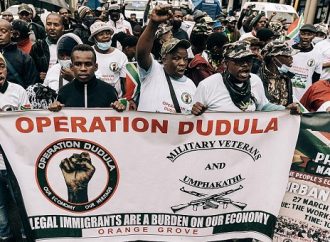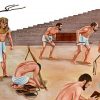Africa will simply be (no) more or less like Europe or the Middle East is today. Political Geography: A number of folks think the modern political geography would simply align with the ethnic groups in existence today. But this is unlikely. How would Africa be today if colonialism never happened? At the time the Europeans
Africa will simply be (no) more or less like Europe or the Middle East is today. Political Geography: A number of folks think the modern political geography would simply align with the ethnic groups in existence today. But this is unlikely.
How would Africa be today if colonialism never happened?
At the time the Europeans came, large African empires had already started assimilating small tribes or forming alliances with other large ethnicities.
Languages would have further diffused and solidified until regional lingua franca are established. These empires and large tribes (like the historical Malian and Songhai, and the newer Oyo, Benin, Zulu, etc) would have maintained their military might to expand their territories and built even stronger city-states through regional commerce while also trading (slaves, minerals and other local commodities) with the Arabs and Europeans (who would have been forced to learn the local languages and acknowledge the regional administrations). Most likely, the Arabs would remain on the fringes of the Sahara while the Europeans stayed on the coast.
Technology: The African city states would have progressed faster with technological developments from the West, as they would have had to import the knowledge instead of the products (which, instead, came through the colonial administrators).
As international technology, trade and communication advanced, the rulers of these empires and city-states would have sent their citizens to other parts to acquire technical knowledge and import relevant technology. (The Malian ruler, Mansa Musa, demonstrated this in the 1330s.)
Towards the end of the 19th century, the rivalling acquisition of technical knowledge and the exploitation of resources between the existing empires and city states would force them into a brutal “African War”. Such a war would help to firmly settle boundary disputes and resource control conflicts.
The alliances formed during the war would be determined by similar developments in America, Europe and Asia. (As a lot of variables would be involved in resolving this conflict, it would be difficult to project the resulting national boundaries. Nevertheless, modern boundaries will likely be based on a mix of geographical features and constituent ethnicities of the city states.)
Economics: The modern national entities resulting from “The Great African War” would be a mix of rich and poor countries, dependent on local resources, and the intelligence and whims of the rulers.
But, in most cases, national wealth will be truly “national” as a form of communalism (or welfare capitalism) will be the dominant economic ideology in accordance with cultural norms.
There will be wealthy individuals in the societies, but not from corrupt practices. In fact, corruption as Africans know it today will be little or non-existent as the political administration would have been based on cultural norm, instead of colonial convenience.
Political: The governments would be largely autocratic as they would have been based on monarchical principles. The citizens would, however, have inherent checks against government excess–checks developed through centuries of cultural norm.
Human rights and democracy as developed in the West would be adopted by some progressive governments but, otherwise, they will be largely dismissed in favour of socially “earned” rights. In some areas, women and young people will have political authority but, generally, older men will control politics.
By the end of the 20th century, ideas from western philosophy will create continuous agitations for constitutional monarchies, particularly in coastal regions.
Religion: The principal religious philosophy would be animist and therefore a more tolerant religious atmosphere would be present. There will be some Muslims in the Northern parts of the continent, with enclaves of Christianity in some coastal countries.
Arts: Local writings in the dominant languages would have spread faster, encouraged by the need to translate texts from the Arabic and Latin “importations”.
With the spread of written and printed material, local histories, myths and cultural norms would have been documented more rapidly thereby generating new material for the next generation to work with.
States or empires that refuse to adopt these ideas would be at a natural disadvantage and would either fade out or get swallowed by the ones that do. By modern times, Africa would be rich in its own documented and easily translatable arts and literature.
In summary, Africa would be radically different from what it is today. The myth of the “saviour” European is only true to the extent that the Europeans saved Africa from the results of their own interference.
Without that original interference, the African ethnic groups would have had a chance to grow into modern nations (having the rich, the poor and the middling) along their own cultural projections and with their own distinct type of issues and solutions. Ayo Sogunro


















Leave a Comment
Your email address will not be published. Required fields are marked with *